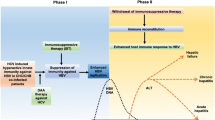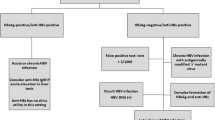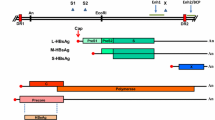Opinion statement
The life expectancy of HIV seropositive persons is approaching the life expectancy of those who are uninfected with HIV. Hepatitis C virus (HCV) infection has emerged as a worldwide epidemic. Given the similar transmission route between HCV and HIV, there has been an explosion in the number of individuals infected with both viruses. Because of the successful introduction of antiretroviral therapy, patients are more susceptible to new opportunistic infections such as HCV. HCV leads to a more rapid progression to end-stage liver disease in patients with HIV, and the morbidity and mortality related to HCV in co-infected patients is on the rise. Therefore, it has become imperative to treat both HIV and HCV in co-infected patients. The primary goal of HCV therapy is permanent eradication of the virus. Secondary goals include reduction in hepatic fibrosis progression, development of decompensated cirrhosis, and hepatocellular carcinoma. Early studies using standard interferon-alfa for the treatment of HCV in co-infected individuals were discouraging, as poor outcomes, high discontinuation rates, and severe adverse events were observed. The current standard of care for treatment of HCV is pegylated-interferon and ribavirin. New studies have recently demonstrated a higher sustained virologic response rate and a better adverse event profile than previously reported in co-infected patients. As a result, we recommend considering all co-infected patients for HCV therapy while watching closely for unique treatment-related toxicities. The treatment of HCV in co-infected patients should be a high priority for all providers.
Similar content being viewed by others
References and Recommended Reading
Alter MJ, Kruszon-Moran D, Nainan OV, et al.: The prevalence of hepatitis C virus infection in the United States, 1988–1994. N Engl J Med 1999, 351: 556–562.
Sherman KE, Rouster SD, Chung RT, Rajicic N: Hepatitis C Virus prevalence among patients infected with Human Immunodeficiency Virus: a cross-sectional analysis of the US adult AIDS Clinical Trials Group. Clin Infect Dis 2002, 34: 831–837.
Sulkowski MS, Thomas DL: Hepatitis C in the HIVInfected Person. Ann Intern Med 2003, 138: 197–207.
Poynard T, Ratziu V, Charlotte F, et al.: Rates and risk factors of liver fibrosis progression in patients with chronic hepatitis C. J Hepatol 2001, 34: 730–739.
Puoti M, Spinetti A, Ghezzi A, et al.: Mortality for liver disease in patients with HIV infection: a cohort study. J Acquir Immune Defic Syndr 2000, 24: 211–217.
Bonacini M, Govindarajan S, Blatt LM, et al.: Patients co-infected with human immunodeficiency virus and hepatitis C virus demonstrate higher levels of hepatic HCV RNA. J Viral Hepat 1999, 6: 203–208.
Eyster ME, Fried MW, Di Bisceglie AM, Goedert JJ: Increasing hepatitis C virus RNA levels in hemophiliacs: relationship to human immunodeficiency virus infection and liver disease. Multicenter Hemophilia Cohort Study. Blood 1994, 84: 1020–1023.
Benhamou Y, Bochet M, Di Martino V, et al.: Liver fibrosis progression in human immunodeficiency virus and hepatitis C virus coinfected patients. The MULTIVIR Group. Hepatology 1999, 30: 1054–1058.
Wit FW, Weverling GJ, Weel J, et al.: Incidence of and risk factors for severe hepatotoxicity associated with antiretroviral combination therapy. J Infect Dis 2002, 186: 23–31.
Sulkowski MS, Thomas DL, Chaisson RE, Moore RD: Hepatotoxicity associated with antiretroviral therapy in adults infected with human immunodeficiency virus and the role of hepatitis C or B virus infection. JAMA 2000, 283: 74–80.
Kontorinis N, Dieterich D: Hepatotoxicity of antiretroviral therapy. AIDS Rev 2003, 5: 36–43.
Kontorinis N, Dieterich DT: Toxicity of non-nucleoside analogue reverse transcriptase inhibitors. Semin Liver Dis 2003, 23: 173–182.
Carr A: HIV protease inhibitor-related lipodystrophy syndrome. Clin Infect Dis 2000, 30(Suppl 2): S135-S142.
Pineda JA, Romero-Gomez M, Diaz-Garcia F, et al.: HIV coinfection shortens the survival of patients with hepatitis C virus-related decompensated cirrhosis. Hepatology 2005, 41: 779–789.
Benhamou Y, Di Martino V, Bochet M, et al.: Factors affecting liver fibrosis in human immunodeficiency virus-and hepatitis C virus-coinfected patients: impact of protease inhibitor therapy. Hepatology 2001, 34: 283–287.
Qurish N, Kreuzberg C, Luchters G, et al.: Effect of antiretroviral therapy on liver-related mortality in liverrelated mortality in patients with HIV and hepatitis C virus coinfection. Lancet 2003, 362: 1708–1713.
Mehta SH, Thomas DL, Torbenson M, et al.: The effect of antiretroviral therapy on liver disease among adults with HIV and hepatitis C coinfection. Hepatology 2005, 41: 123–131.
Greub GLB, Lederberger B, Battegay M, et al.: Clinical progression, survival, and immune recovery during antiretroviral therapy in patients with HIV-1 and hepatitis C virus coinfection: the Swiss HIV Cohort Study. Lancet 2000, 356: 1800–1805.
Sulkowski MS, Moore RD, Mehta SH, et al.: Hepatitis C and progression of HIV disease. JAMA 2002, 288: 199–206.
McHutchison JG, Gordon SC, Schiff ER, et al.: Interferon alfa-2b alone or in combination with ribavirin as initial treatment for chronic hepatitis C. Hepatitis Interventional Therapy Group. N Engl J Med 1998, 339: 1485–1492.
Manns MP, McHutchison JG, Gordon SC, et al.: Peginterferon alfa-2b plus ribavirin compared with interferon alfa-2b plus ribavirin for initial treatment of chronic hepatitis C: a randomized trial. Lancet 2001, 358: 958–965.
McHutchison JG, Fried MW: Current therapy for hepatitis C: pegylated interferon and ribavirin. Clin Liver Dis 2003, 7: 149–161.
FriedM, Shiffman M, Reddy R, et al.: Peginterferon alfa-2b plus ribavirin for chronic hepatitis C virus infection. N Engl J Med 2002, 347: 975–983. This paper showed the SVR among different genotypes for the current standard of care of hepatitis C treatment.
Muir AJ, Bornstein JD, Killenberg PG: Peginterferon alfa-2b and ribavirin for the treatment of chronic hepatitis C in blacks and non-hispanic whites. N Engl J Med 2004, 350: 2265–2271.
Jeffers LJ, Cassidy W, Howell CD, et al.: Peginterferon alfa-2a (40kd) and ribavirin for black American patients with chronic HCV genotype 1. Hepatology 2004, 39: 1702–1778.
Kaplan JE, Masur H, Holmes KK: Guidelines for preventing opportunistic infections among HIV infected persons. Morb Mortal Wkly Rep 2002, 51: 1–46.
Soriano V, Sulkowski M, Bergin C, et al.: Care of patients with chronic hepatitis C and HIV co-infection: recommendations from the HIV-HCV International Panel. AIDS 2002, 16: 813–828.
Romero M, Perez-Olmeda M, Garcia-Samaniego J, Soriano V: Management of chronic hepatitis C in patients co-infected with HIV: focus on safety considerations. Drug Saf 2004, 27: 7–24.
Sulkowski M, Felizarta F, Smith C, et al.: Daily versus thrice-weekly interferon Alfa-2b plus ribavirin for the treatment of chronic hepatitis C in HIV-infected persons: a multicenter randomized controlled trial. J Acquir Immune Defic Syndr 2004, 35: 464–472.
Neau D, Trimoulet P, Winnock M, et al.: Comparison of 2 regimens that include interferon-alfa-2a plus ribavirin for treatment of chronic hepatitis C in human immunodeficiency virus-coinfected patients. Clin Infect Dis 2003, 36: 1564–1571.
Chung R, Andersen J, Volberding P, et al.: Peginterferon alfa-2a plus ribavirin vs interferon alfa-2a plus ribavirin for chronic hepatitis C virus infection in HIVco-infected persons. N Engl J Med 2004, 351: 451–459.
Perronne C, Carrat F, Bani-Sadr F, et al.: Final results of ANRS HC02-RIBAVIC: A randomized controlled trial of pegylated-alfa-2b plus ribavirin vs interferon-alfa-2b plus ribavirin for the initial treatment of chronic hepatitis C in HIV co-infected patients [abstract 117LB]. Eleventh Conference on Retroviruses and Opportunistic Infections. San Fransisco, CA; February, 2004.
TorrianiFJ, Rodriguez-Torres M, Rockstroh et al.: Peginterferon alfa-2a plus ribavirin for chronic hepatitis C virus infection in HIV-infected patients. N Engl J Med 2004, 351: 438–450. This study is the largest to date and demonstrates the highest SVR for co-infected patients.
Perez-Olmeda M, Nunez M, Romero M, et al.: Pegylated IFN-alpha2b plus ribavirin as therapy for chronic hepatitis C in HIV-infected patients. AIDS 2003, 17: 1023–1028.
Levitan SA, Uriel A, Kontorinis N, Dieterich DT: Use of dronabinol for treatment of common side effects of chronic hepatitis C therapy. Gastro 2004, 126(Suppl 2): A-723.
Schambelan M, Benson CA, Carr A, et al.: Management of metabolic complications associated with anti-retroviral therapy for HIV-1 infection: recommendations of an international AIDS society-USA panel. J Acquir Immune Defic Syndr 2002, 31: 257–275.
Ohnishi K, Matsuo S, Matsutani K, et al.: Interferon therapy for chronic hepatitis C in habitual drinkers: comparison with chronic hepatitis C in infrequent drinkers. Am J Gastroenterol 1996, 91: 1374–1379.
Davis GL, Rodrigue JR: Treatment of chronic hepatitis C in active drug users. N Engl J Med 2001, 345: 215–217.
Castera L, Zigante F, Bastie A, et al.: Incidence of interferon alfa-induced depression in patients with chronic hepatitis C. Hepatology 2002, 35: 978–979.
Farah A: Interferon-induced depression treated with citalopram. J Clin Psychiatry 2002, 63: 166–167.
Braun M, Vierling JM: The clinical and immunologic impact of using interferon and ribavirin in the immunosuppressed host. Liver Transpl 2003, 9: S79-S89.
Janssen HLA, Brouwer JF, van der Mase RC, et al.: Suicide associated with alpha-interferon therapy for chronic viral hepatitis. J Hepatol 1994, 21: 241–243.
Fontaine H, Pol S: Side effects of interferon-alfa in treating hepatitis C virus infection. Transplant Proc 2001, 33: 2327–2329.
Dieterich DT, Wasserman R, Brau N, et al.: Once-weekly epoetin alfa improves anemia and facilitates maintenance of ribavirin dosing in hepatitis C virus-infected patients receiving ribavirin plus interferon alfa. Am J Gastroenterol 2003, 98: 2491–2499.
McHutchison JG: Hepatitis C advances in antiviral therapy: what is accepted treatment now? J Gastroenterol Hepatol 2002, 17: 431–441.
Mauss S, Valenti W, DePamphilis J, et al.: Risk factors for hepatic decompensation in patients with HIC/ HCV coinfection and liver cirrhosis during interferonbased therapy. AIDS 2004, 18: F21-F25.
Sulkowski MS: Anemia in the treatment of hepatitis C virus infection. Clin Infect Dis 2003, 37(Suppl 4): S315-S322.
Sood ARN, Russo MW, et al.: Use of granulocyte colony stimulating factor (GCSF) for interferon induced neutropenia in patients with chronic hepatitis C infection [abstract 1029]. Program and abstracts of the 52nd annual meeting of the AASLD (Dallas, TX). Alexandria: AASLD; 2001: 429A.
Patel K, Dev A, Muir AJ, McHutchison JG: Ribavirin as maintenance therapy for hepatitis C patients: an interim peacekeeper? Hepatology 2003, 38: 21–24.
Lafeuillade A, Hittlinger G, Chadapaud S: Increased mitochondrial toxicity with ribavirin in HIV/HCV coinfection. Lancet 2001, 357: 280–281.
Landau A, Batisse D, Piketty C, et al.: Lack of interference between ribavirin and nucleoside analogues in HIV/HCV coinfected individuals undergoing concomitant anti-retroviral and anti-HCV combination therapy. AIDS 2000, 14: 1857–1858.
Henessy M, Mulcahy F, Spiers P, et al.: Differential effects of combined pegylated interferon and ribavirin therapy on intracellular nucleotide triphosphate levels in HIV/HCV co-infected patients, a potential mechanism for enhanced toxicity [abstract 822]. Eleventh Conference on Retroviruses and Opportunitic Infections. San Francisco, CA; February, 2004.
De Franceschi L, Fattovich G, Turrini F, et al.: Hemolytic anemia induced by ribavirin therapy in patients with chronic hepatitis C virus infection: role of membrane oxidative damage. Hepatology 2000, 31: 997–1004.
Rendon AL, Nunez M, Romero M, et al.: Early monitoring of Ribavirin plasma concentrations may predict anemia and early virologic response in HIV/Hepatitis C virus-coinfected patients. JAIDS 2005, 39: 401–405.
Sulkowski M, Dieterich DT, Bini E, et al.: Epoetin-alfa administered once weekly improves anemia in HIV/ HCV co-infected patients treated with interferon/ ribavirin therapy: a randomized controlled trial. JAIDS 2005, 39: 504–506. This paper demonstrates the major importance of using epoetin-alfa for the anemia frequently seen associated with interferon and ribavirin therapy.
Author information
Authors and Affiliations
Rights and permissions
About this article
Cite this article
Santos, S.A., Kontorinis, N. & Dieterich, D.T. Management of chronic Hepatitis C virus in patients with HIV. Curr Treat Options Gastro 8, 433–441 (2005). https://doi.org/10.1007/s11938-005-0029-5
Issue Date:
DOI: https://doi.org/10.1007/s11938-005-0029-5




